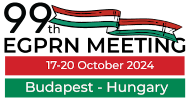Exploring Self-Care: Cross-Sectional Study on GPs' Mental Health Maintenance amid the Pandemic
Ivana Keenan, Esther Van Poel, Els Clays, Sara Willems, Milena Šantrić Milićević, Katica Tripković, Radost Assenova, Kathryn Hoffmann, Iliana-Carmen Busneag, Gazmend Bojaj, Liubovė Murauskienė, Claire Collins
Keywords: Self-care, Wellbeing, General Practice, COVID-19, Resilience
Background:
Working as a General Practitioner (GP) is a challenging career, and can contribute to stress, burnout, depression, and other mental health problems among doctors. Practicing self-care is essential in achieving work-life balance and ensuring the overall well-being of GPs. A lack of self-care was particularly evident during the COVID-19 pandemic when GPs predominately focused on patient care and often neglected their own needs.
Research questions:
The present study aimed to investigate:
What were the self-care practices adopted by GPs amid the COVID-19 pandemic?
What was the relationship between self-care practices and the risk of experiencing mental distress?
Method:
The study utilized data from a cross-sectional PRICOV-19 study, where an online self-reported questionnaire was distributed among GP practices across 38 countries. The Six Domains of Self-Care theoretical framework was applied to investigate open-text responses to maintaining mental health during COVID-19. The Mayo Clinic Well-Being Index (eWBI) was used to assess mental health well-being. The SPSS Statistics software was applied for data analysis.
Results:
In total, 2,949 GPs were included in the study; and most of the respondents (65.5%) were considered at risk of distress (eWBI≥2). Many GPs prioritised ‘physical’ (61.6%), followed by ‘relational’ (38.0%) and ‘psychological’ (34.6%) self-care practices to maintain their mental health. Participants who practiced ‘professional’ self-care practices had the lowest distress risk (eWBI=1.99, p<0.001). Overall, 5% of GPs disclosed not applying any practices to maintain their mental health and were more likely to experience a higher risk of distress (eWBI= 4.90, p<0.001).
Conclusions:
GPs have adapted uniquely during the pandemic yet experienced significant stress despite self-care efforts. A robust long-term strategic plan, focused on the development of supportive work environments and the promotion of a healthy work-life balance, is necessary to enhance GP resilience and ensure optimal well-being.
Points for discussion:
#47

